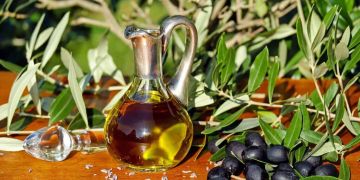Olive Oil has also been used as a source of fuel, as an ingredient in homemade soap and as a skin care remedy for hundreds of years. Olive Leaf is also a popular health supplement and we have an article on this as well.
Sources of Olive Oil
Olives are a major crop of the Mediterranean area, especially the countries of Greece, Italy and Spain. In these regions, olives grow on trees in groves and play a large role in the cuisine of the region. To obtain the oil, olives are harvested and then crushed and pressed by specialized machines. Through a complex and carefully crafted process, the oil is extracted from the olives. There are numerous different varieties of olive, and thus different varieties of olive oil, each with its own subtle flavor characteristics.
Virgin and Refined Olive Oil Explained
Beyond differing olive characteristics, olive oils vary according to the way in which they are extracted. If an olive oil has been extracted purely by mechanical means with no chemical involvement, it is known as "virgin" or "extra-virgin" olive oil. Oils that have been treated chemically to reduce acidity or defective taste characteristics are known as "refined." Sometimes you will find oils labelled just "pure olive oil" or even simply "olive oil"; these are typically blends of virgin and refined oils. Olive oils come in a variety of colors, from pale green to deep golden yellow.
Olive Oil Health Benefits
Health experts have known for some time that olive oil is beneficial for physical wellness. Olive oil is a source of unsaturated fat, or omega-3 fatty acids. This type of fat is good for your heart, unlike its saturated counterpart. Omega-3 fatty acids are powerful disease fighters. Because of olive oil's omega-3 content, it is believed that olive oil helps prevent heart disease and stroke and encourages healthy cholesterol levels. Some experts believe that olive oil can help prevent certain cancers as well. It is also known to help lower blood sugar. Its antioxidant content is thought to help prevent digestive tract and prostate tumors and to reduce unhealthy cellular inflammation throughout the body.
Olive oil may also help displace another type of fat, omega-6 fatty acids, which can be problematic in the modern Western diet because most people ingest far too many of them via processed foods and corn oil products. If olive oil can help neutralize some of that excessive omega-6 fatty acid presence in addition to providing necessary omega-3 fatty acids, its health benefits are even greater.
How to Take
In your diet
Olive oil is mainly digested in liquid form as part of one's diet, such as in salad dressings and marinades or as a fat source for sautéing. Olive oil can also be used as a dip for breads or drizzled on cooked dishes such as grilled, roasted or steamed vegetables, pastas or other grains. Some people use olive oil in baked goods as well. Certain food items are good sources of olive oil in and of themselves, such as tuna, anchovies, sun-dried tomatoes or roasted red peppers packed in oil.
Olive oil capsules are also available for consumption as a supplement. Some health-minded individuals prefer to take a spoonful of olive oil daily, such as before bed, to encourage good digestion, reduce inflammation, promote high levels of “good” cholesterol and keep blood pressure in check.
Cosmetic use
But olive oil’s uses don’t stop at cooking, baking and as part of a healthy diet. Many people swear by olive oil used topically as a moisturizer, a treatment for skin irritations and problems, a shaving oil and even as a hair conditioner. Olive oil is a common ingredient in all-natural soaps and cosmetics, as well, and promotes soft, smooth skin.
There are many ways to benefit from olive oil as a dietary supplement and as a natural home remedy for numerous concerns.





